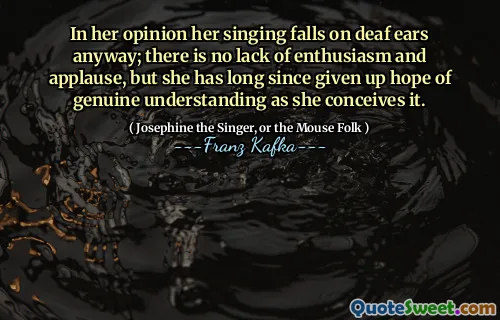Josephine the Singer, or the Mouse Folk is a novella by Franz Kafka exploring themes of alienation, art, and societal roles through the story of a mouse named Josephine. She is a performer who captivates other mice with her singing and represents artistic expression amidst a community that struggles to appreciate her talent fully. Despite her popularity, Josephine feels isolated due to the expectations placed on her by her fellow mice, who both admire and demand her to sing.
As the narrative unfolds, Josephine’s identity becomes a point of contention. She grapples with the dual role of being both an artist and a member of a community that cannot fully understand her art. The novella highlights the tension between individuality and conformity, raising questions regarding the nature of art and its reception within society.
Ultimately, Kafka invites readers to reflect on the meaning of creative expression, the burden of communal expectations, and the often lonely pursuit of artistic endeavors. Josephine’s plight serves as a poignant metaphor for the struggles faced by artists in a world that may not always value or comprehend their work.
More »
Today Birthdays
1955 -
Max Lucado
1946 -
John Piper
1842 -
William James
1907 -
Abraham Joshua Heschel
1887 -
Aldo Leopold
1755 -
Alexander Hamilton
1976 -
Alethea Kontis
1971 -
Mary J. Blige
1825 -
Bayard Taylor
1943 -
Jim Hightower
1885 -
Alice Paul
1923 -
Carroll Shelby
1928 -
David L. Wolper
1954 -
Kailash Satyarthi
1972 -
Amanda Peet
1946 -
Naomi Judd
1970 -
Malcolm D. Lee
1955 -
Christian Marclay
1973 -
Rahul Dravid
1987 -
Jamie Vardy
1942 -
Clarence Clemons
1992 -
Fatima Sana Shaikh
1948 -
Larry Harvey
1930 -
Rod Taylor
